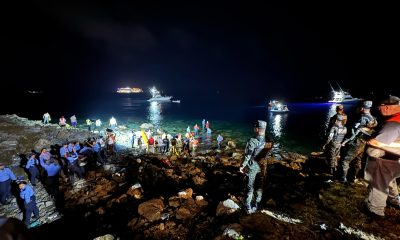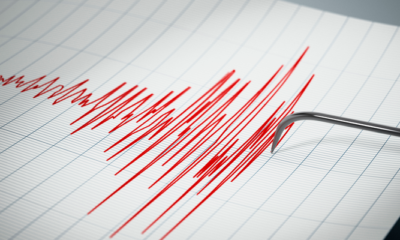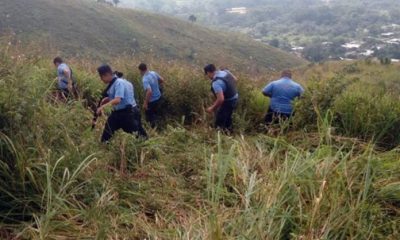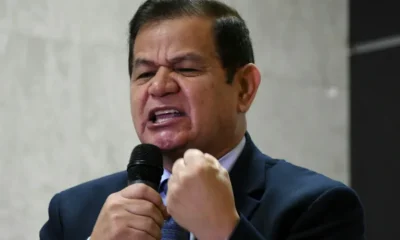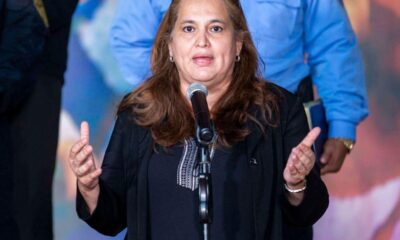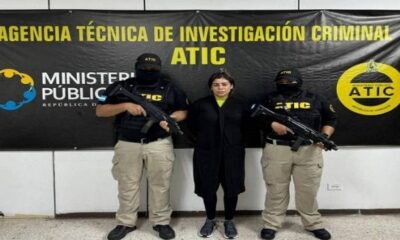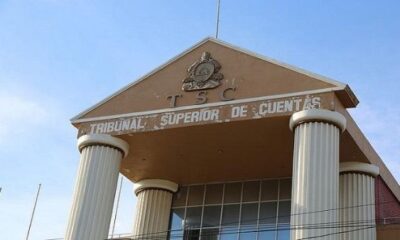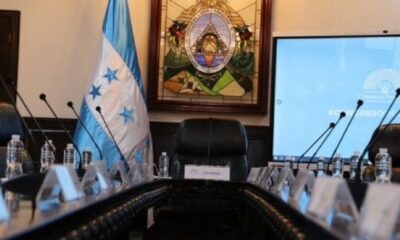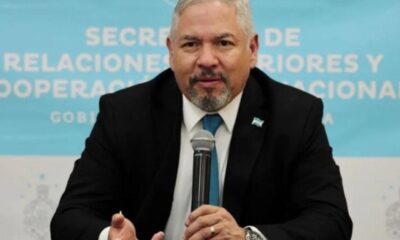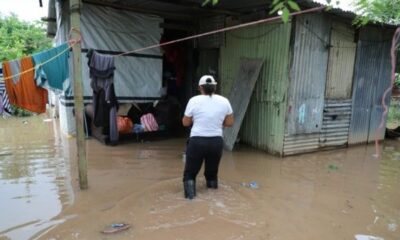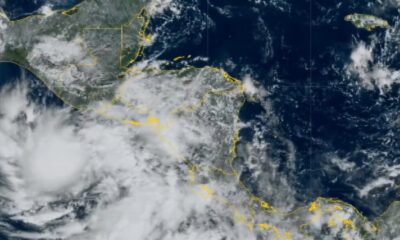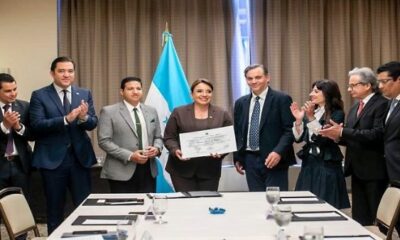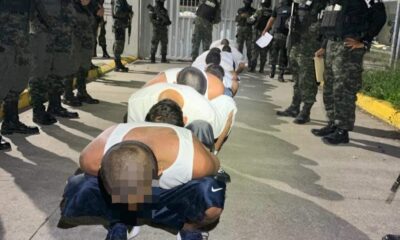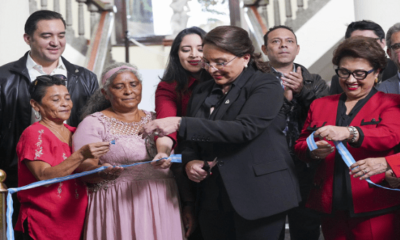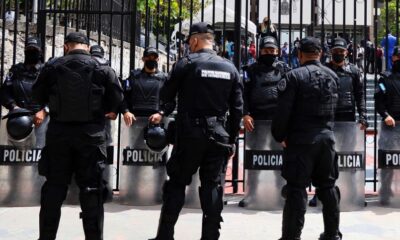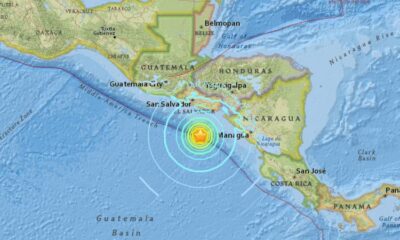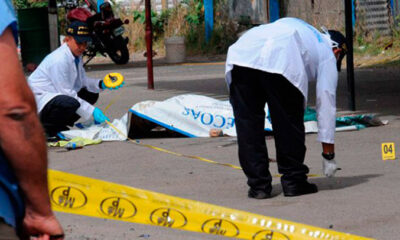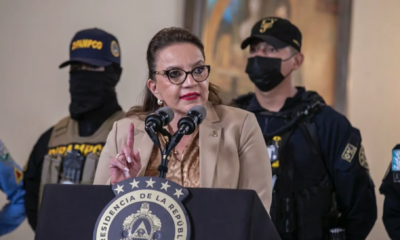Central America
Former president of Honduras found guilty of drug trafficking by U.S. justice
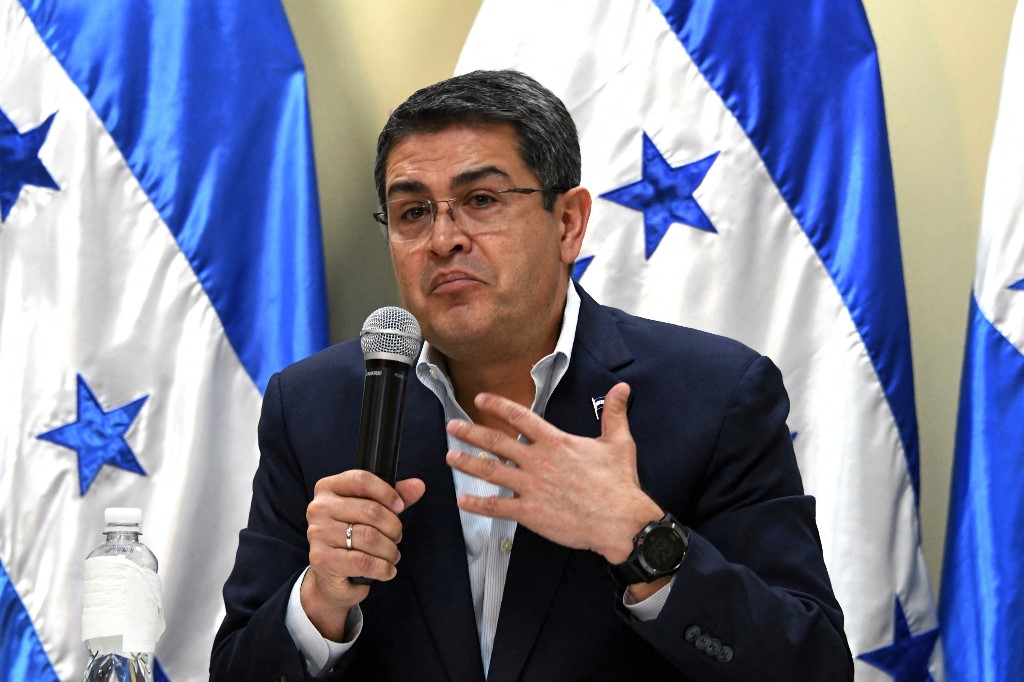
The prosecution, alleging that the former president created a narco-state during his presidency (2014-2022), accused him of conspiring to traffic drugs to the United States, as well as conspiring to traffic arms, offenses that carry potential life sentences.
Former President of Honduras, Juan Orlando Hernández, was declared guilty of drug trafficking and arms trafficking by a federal jury in New York on Friday, concluding a landmark trial that could see him spend the rest of his life in prison.
On its second day of deliberations, the 12-member jury announced its unanimous verdict shortly before 13:30 local time, finding Hernández guilty on all three charges brought by the prosecution.
“I am innocent, tell the world, I love you,” Hernández said as he left the court, addressing his family, including two sisters-in-law, and the three generals who came to testify on his behalf in this trial.
Flanked by his lawyers, moments before Judge Kevin Castel called the parties to hear the verdict, 55-year-old Hernández appeared to be praying.
Afterwards, he reacted to the verdict by shaking his head in disbelief as the jury spokesperson responded to each of the judge’s questions to establish his guilt.
The prosecution, asserting that the former president created a narco-state during his presidency (2014-2022), accused him of conspiring to traffic drugs to the United States, as well as conspiring to traffic arms, offenses that carry potential life sentences.
The judge is yet to announce the former president’s sentence in the coming weeks or months.
According to the U.S. prosecution, Hernández participated in and protected a network that sent over 500 tons of cocaine to the United States between 2004 and 2022, while he was a congressman, president of the Congress, and later president of the Republic. In exchange, he allegedly received millions of dollars from cartels, including Mexican drug trafficker Joaquín “El Chapo” Guzmán, who was sentenced to life in prison in the United States.
Extradited in April 2022 to the United States, three months after handing over the presidency to leftist successor Xiomara Castro, the convicted individual is known for the infamous phrase “We are going to put the drugs in their noses (to the Americans) and they won’t even notice,” according to a witness.
Asked by AFP, defense attorney Renato Stabile, with tears in his eyes, said that “obviously the verdict is harsh, but mentally, he is very strong.”
This staunch ally of Republican President Donald Trump (2017-2021) once boasted about Washington’s praise for his government’s efforts in the fight against drug trafficking.
Prosecutor Jacob H. Gutwillig reminded the jury that while the accused publicly promoted laws against drug trafficking and the extradition of drug lords to the United States, he also met with U.S. officials behind closed doors. However, “none of this undoes what the accused did behind closed doors.”
“He is a drug trafficker,” Gutwillig concluded.
Since 2014, Honduras has extradited 38 people accused of drug trafficking to the United States. Others surrendered to U.S. authorities or were arrested outside the country.
Former police chief Juan Carlos “Tigre” Bonilla and former police officer Mauricio Hernández, who were to be tried with the former president, pleaded guilty to drug trafficking a few days before the trial began. Their sentences will be announced in the coming months.
Many of the dozen witnesses presented by the prosecution highlighted the corruption and close ties between politics and drug trafficking.
“The political elite, which is also the economic elite, has operated in complete impunity” over the past 15 years, since the 2009 coup, emboldened by “the support it received from foreign governments despite knowing that it was heavily involved in drug trafficking,” says American activist Karen Spring of the Honduras Solidarity Network to AFP.
“All state institutions are heavily penetrated by drug trafficking, particularly the police and the military,” she asserts.
Extradited in April 2022, three months after leaving office, the former president will follow in the footsteps of his brother Tony Hernández and Geovanny Fuentes, a close associate of his brother, who are serving life sentences in the United States, as well as Fabio Lobo, son of former President Porfirio Lobo (2010-2014), and lawmaker Fredy Renán Nájera, all convicted of drug trafficking.
Central America
Washington Imposes Visa Ban on La Modelo Director Amid Crackdown in Nicaragua

The United States government announced Wednesday that it has imposed visa restrictions on Roberto Clemente Guevara Gómez, director of Nicaragua’s largest prison, La Modelo, for his involvement in actions that violate human rights.
In a statement, U.S. Secretary of State Marco Rubio said the measure is intended to promote accountability for abuses committed under what he described as the “Murillo-Ortega dictatorship” against political prisoners.
Rubio specified that Guevara Gómez was designated for participating in “a gross violation of the human rights of a political prisoner.” The sanction was issued under the 2024 Department of State, Foreign Operations, and Related Programs Appropriations Act, which bars the sanctioned individual — and potentially immediate family members — from entering the United States.
“United States demands the immediate and unconditional release of all political prisoners unjustly detained in Nicaragua,” the statement added.
Ongoing tensions between Washington and Managua
Washington rejected Nicaragua’s November 2021 elections, in which President Daniel Ortega and his wife, now co-president Rosario Murillo, were reelected while seven potential challengers were in prison.
Relations between the two countries remain tense amid expanding U.S. sanctions and increasing diplomatic pressure on the Nicaraguan government.
On January 10, marking Ortega’s 19 years in power, Nicaragua released “dozens of detainees,” including political prisoners. The move came one day after the U.S. Embassy in Managua stated that “more than 60 people” remain “unjustly detained or disappeared” in the Central American nation.
U.S. officials have continued to push for the “unconditional release” of political prisoners rather than selective or temporary releases.
Ortega, 80, governs alongside Murillo with consolidated authority, having strengthened executive power through constitutional reforms and security measures, while the opposition has been weakened by imprisonment, exile, and the revocation of citizenship and property rights.
Central America
Guatemala’s Attorney General Consuelo Porras Loses Bid for Constitutional Court Seat

Guatemala’s attorney general, Consuelo Porras, who has been sanctioned by the United States over corruption allegations, lost a key vote on Monday in which a public university selected two of the 10 magistrates for the country’s highest constitutional court. However, she could still seek a seat through another nominating body.
The election of five full magistrates and five alternates to the Corte de Constitucionalidad (CC) is taking place gradually over more than two months and is considered crucial in the ongoing struggle for control of Guatemala’s judiciary, which critics say has long been influenced by a political and economic elite accused of corruption.
According to results announced at a press conference, the governing council of the Universidad de San Carlos de Guatemala (USAC) rejected Porras, who had applied as either a full or alternate magistrate, and instead chose two candidates aligned with the university rector. The vote was held at a hotel in Antigua, about 35 kilometers from the capital.
Despite the setback, Porras — whose term as attorney general ends on May 16 — could still be nominated to the Constitutional Court by the Corte Suprema de Justicia, which appoints two magistrates. The remaining six are selected by the president, the bar association and Congress.
“It’s always a possibility,” the 72-year-old lawyer said days earlier when asked by reporters whether she would seek nomination through another institution if she lost the USAC vote.
Porras has been sanctioned by Washington and the European Union for allegedly attempting two years ago to block the inauguration of President Bernardo Arévalo and for pursuing legal actions against anti-corruption prosecutors, judges, journalists and social leaders since taking office in 2018.
The USAC vote was controversial because most members of the university’s governing council are serving beyond the expiration of their terms. Students, academics and social activists staged protests against Porras’ candidacy.
Central America
Teens visit ETESAL substation to learn about responsible energy use

Within the framework of World Energy Day, teenagers from the institutional care center Ciudad Niñez y Adolescencia (CNA), run by the Consejo Nacional de la Primera Infancia, Niñez y Adolescencia (Conapina), took part in an educational visit to a substation operated by Empresa Transmisora de El Salvador (ETESAL) in Santa Ana.
The aim of the activity was to give participants first-hand knowledge of how the country’s electricity transmission system works and to highlight the importance of responsible energy use.
During the tour, the group learned about the process that delivers electricity to homes, businesses, and industries. They were also introduced to specialized technical equipment and the safety measures required to ensure an efficient and reliable service.
Before the guided visit, the teenagers attended two informative talks and an environmental awareness session focused on the relevance of responsible energy consumption and its impact on the environment.
According to Nelson Menjívar, head of Conapina’s programs unit, the initiative serves a dual purpose. “It has two objectives: a recreational component and an educational one, so that adolescents can learn about the work carried out by ETESAL and how some of the resources they use at home are generated. This is in keeping with the guarantees established under the Crecer Juntos law; we ensure those rights for children,” he said.
Menjívar stressed that these activities help young people better understand how essential services function in their daily lives while promoting efficient consumption habits and a culture of environmental respect and care.
The event is part of the principle of shared responsibility set out in the Crecer Juntos law, promoted by the administration of Nayib Bukele, which states that families, society, private companies, and the State must work together to safeguard the comprehensive well-being of children and adolescents.
-

 International13 hours ago
International13 hours agoFamily of “El Mencho” Seeks Return of Body After Deadly Military Operation
-
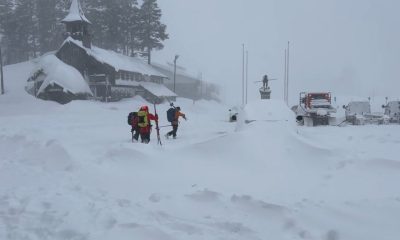
 International4 days ago
International4 days agoNinth Victim Recovered After Deadliest U.S. Avalanche in Decades
-

 International3 days ago
International3 days agoOver 40 Million Affected by Major Snowstorm in Northeastern U.S.
-

 International5 days ago
International5 days agoTrump Defies Supreme Court With New 10% Global Tariff
-

 International13 hours ago
International13 hours agoLarry Summers Steps Down from Harvard Role Amid Epstein Controversy
-

 International13 hours ago
International13 hours agoIran’s President Optimistic Ahead of Geneva Nuclear Talks with U.S.
-

 International13 hours ago
International13 hours agoBill Gates Admits “Serious Mistake” Over Epstein Ties
-

 International13 hours ago
International13 hours agoStephen Hawking Photo Appears in Newly Released Epstein Documents
-

 International3 days ago
International3 days agoNine People Killed in Two Armed Attacks in Manabí, Ecuador





























